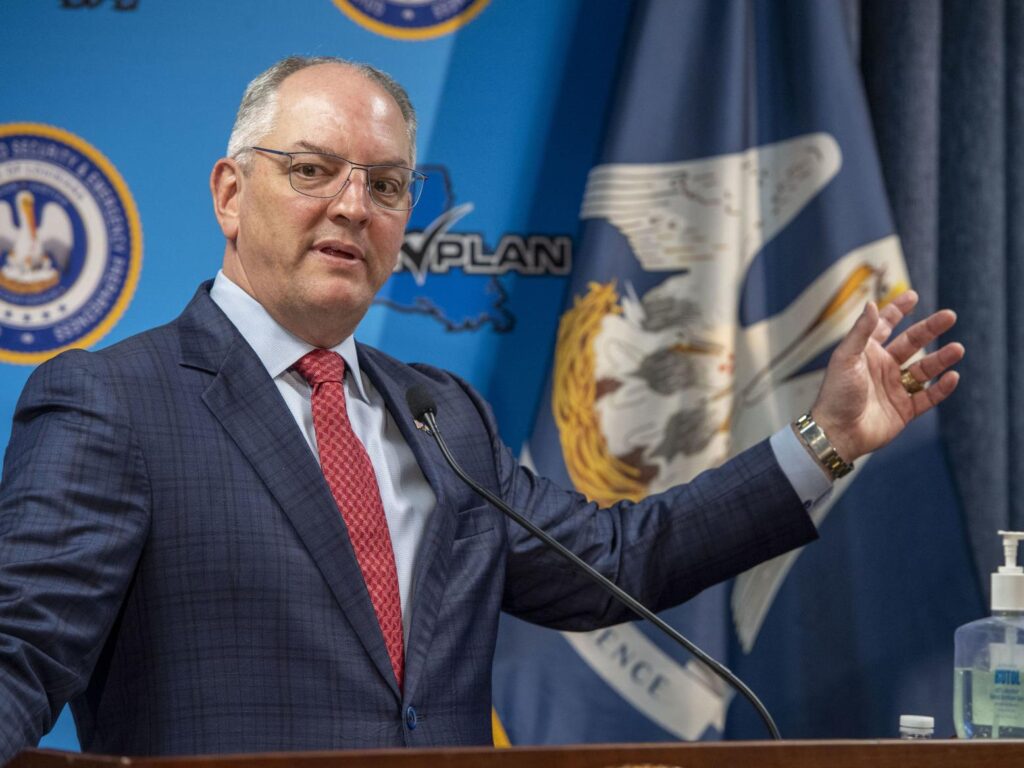Gov. John Bel Edwards addressed Louisiana lawmakers Monday on the first day of the new legislative session, delivering a state of the state speech focused on his budget, redistricting, storm recovery and legislative priorities.
Edwards’ final state of the state address focused heavily on the hardship the state has endured from COVID-19 and severe weather over the past two years, and how Louisiana is recovering after the death of more than 16,800 residents because of the pandemic.
“On March 11, 2020, I signed a public health emergency for COVID-19,” he said. “And while it changed to reflect the ebb and flow of the pandemic, it has remained in effect since then. This Wednesday, the order expires. And after 24 months, I will not be renewing it.”
Edwards credited the state’s recovery to frontline workers, access to vaccines and therapeutic treatments that have worked together to drive down infections.
The governor also spoke about a state budget situation that has improved from a $1 billion deficit when he took office to billions in excess in the coming fiscal year, as well as his plans to invest the money. He pointed to pay raises for teachers and support staff, investments in all levels of the state’s education system, per diem increases for those caring for the sick and elderly and infrastructure investments included in his executive budget.
“Today, as I stand here before you, we have hundreds of millions in surplus, even more in current year excess, and billions in federal funding through the American Rescue Plan and the Infrastructure and Jobs Act,” Edwards said. “It all adds up to a historic opportunity to transform our state through investments in education infrastructure projects that have been pipe dreams, long overdue pay raises for some of our most dedicated workers and combating the effects of climate change.”
Edwards said he is asking lawmakers to devote the first $50 million of any increase in the revenue forecast to increase teacher raises from a proposed $1,500 to $2,000 and to increase supplemental pay for first responders – police officers and firefighters – by $100 per month.
Edwards highlighted spending in the executive budget for infrastructure mega projects such as a $500 million downpayment for a new Baton Rouge bridge over the Mississippi River, $100 million for a bridge in Lake Charles and $500 million in water and sewer improvements statewide.
The governor also cited plans to improve Louisiana roadways, and his proposal to dedicate $550 million in federal COVID funds to replenish the state’s Unemployment Insurance Trust Fund.
“Some folks may ask why this is a priority,” he said of replenishing the trust fund. “Our businesses are still recovering from the pandemic. If we don’t replenish the trust fund, it will automatically trigger an increase in taxes on businesses in this state – big and small, which pay into the trust fund.”
Edwards focused on work underway to improve internet access in Louisiana, as well as legislative priorities that ensure “that the citizens of this state are fairly represented.”
To that end, he urged lawmakers to rework a congressional map approved by the Legislature that he vetoed last week, and voiced support for legislation to establish an independent redistricting commission for future redistricting efforts. The fact that none of the maps produced during Louisiana’s special redistricting session increased minority representation, despite the state’s growing Black population, is evidence the system is unfair, he said.
“The most egregious, in my view, is the congressional map because there are half as many majority minority districts as the law, basic fairness and, I believe, basic math require,” Edwards said.
Other legislative priorities cited by the governor included legislation to hold law enforcement accountable for malfeasance in office for constitutional civil rights violations, and reforms to insurance and other laws to help residents more quickly recover after natural disasters.
My agenda includes bills focused on hurricane deductibles, claim transparency, enforcing insurance fraud laws, revamping the adjuster registry so policyholders can verify adjusters, and stopping mortgage companies from withholding insurance money without good reason,” he said.
Edwards also discussed the state’s plan for combating climate change, such as leasing areas of the Gulf Coast for wind energy, as well as increasing the minimum wage and efforts to close the gender pay gap.
“There is not a person in this room who can tell me with a straight face that a $7.25 minimum wage from 13 years ago is fair or acceptable, especially given the current rate of inflation,” he said. “Our workers and families deserve better.”
This article was originally posted on End of COVID emergency highlights Edwards’ state of the state











More Stories
Kemp signs executive order to extend suspension of Georgia’s motor fuel tax until July 14
Florida continues to outperform U.S. in economic success
Newsom announces funding expansion for reproductive services